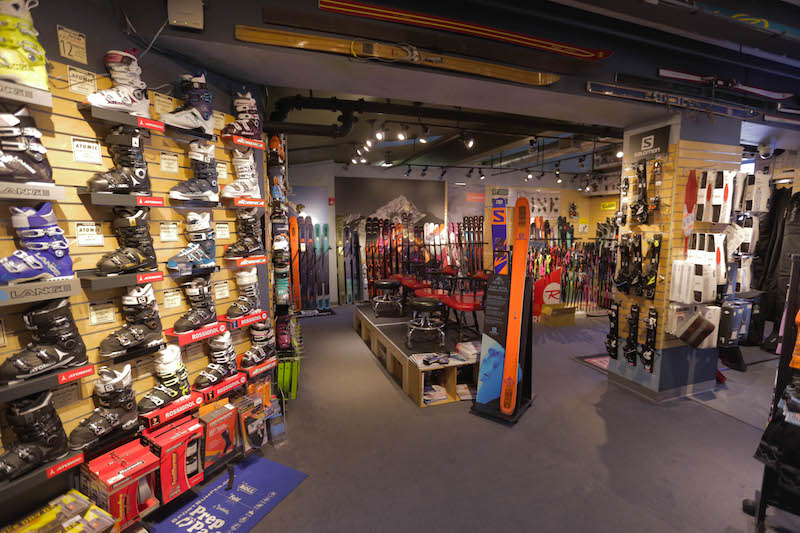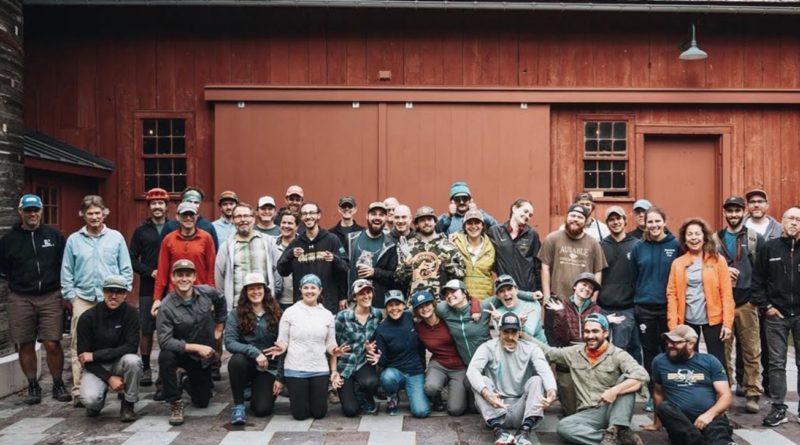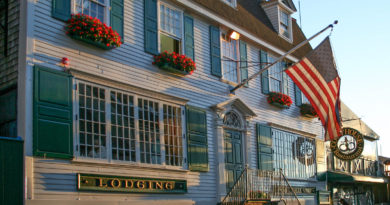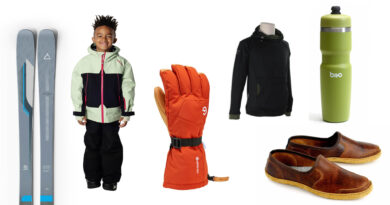50 Years of Selling Fun
In 1969 a group of University of Vermont students decided to open an outdoor retail store. Over the next 50 years, Burlington’s Skirack helped make Vermont’s outdoor scene what it is today. UPDATE: On Dec. 13, lost one of it owners, Spike Clayton to a battle with cancer. Our condolences to all who knew him as an athlete, friend, family member and shop owner.
“We were just a bunch of fraternity brothers at University of Vermont sitting around drinking beers when we thought it might be fun to open an outdoor gear shop,” remembers Zandy Wheeler.
It was 1968—the year Robert Kennedy and Martin Luther King were assassinated. The Beatles released the White Album that November. A gallon of gas cost 34 cents. Lycra, a material invented 10 years earlier by DuPont, was making its way from girdles into outdoor gear, remembers Linda Beyus, who later became Skirack’s apparel buyer. And not far from Burlington, the Trapp Family Lodge had just begun grooming cross-country trails and teaching guests to Nordic ski.

“I liked to ski, run and ride bikes but I wasn’t necessarily a top athlete,” says Zandy, then a kid in his 20s from Mount Kisco, New York who was, in his words “really into gear.”
At the time, the main ski shop in Burlington was The Alpine Shop and the bike shop was Earl’s Cyclery. “Alpine Shop was a good shop, but we wanted something a little less formal, a little edgier,” says Zandy.
They found a small storefront on Center Street (the front half of what is now The Daily Planet) and opened The Skirack in 1969. “We packed it full of gear we loved—skis, boots and more,” Zandy recalls. “At the end of the ski season we had sold a lot—but probably not enough to cover our costs,” he remembers with a grin. And there was inventory left over.
“We couldn’t just do another sale. We had to do it our way,” says Zandy. And so was born “The Midnight Sale.” “We’d open the store at midnight and every few hours the prices would drop—like at 2 a.m. or 4 a.m.” The sale proved popular, so much so that “one year, the crowds were so big they broke the glass on the door trying to get in.”
The crew soon realized they needed to diversify beyond skis and started selling bikes as well—”high quality bikes from Europe,” Zandy says. Phil Hammerslough, who had been leading bike tours joined the shop as a partner. “John Wheeler and I drove a truck down to New York, filled it with about 100 Italas—at the time ‘high tech 10-speeds’— and brought them back. By the end of the month, we’d sold all of them at $110 each,” Hammerslough remembers. “The secret was that we didn’t just sell the bikes, we showed them why a bike was worth $110–which was a lot more than a Schwinn cost.”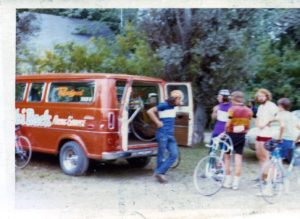
Some of the early bike shop employees included Richard Sachs, who went on to build a reputation as a frame builder, Johnny Arbello (who would later wrench for top teams) and, for a few weeks, Bill Humphreys, one of four American cyclists who, in 1973, was on the first U.S. team to burst into the top ranks of the European race circuit.
Fifty years later, Skirack has helped shape the landscape of outdoor recreation in Vermont. It’s been named Snowsports Retailer of the Year and Nordic Retailer of the Year by Ski Industries of America,, one of the 20 Best Running Shops in America by Gear Patrol and has repeatedly made the list of America’s Best Bike Shops compiled by the National Bike Dealer’s Association. It has put on clinics on everything from bike maintenance to running technique with top pros. And each year it fits and outfits kids from the King Street Center with running shoes free of charge so they can participate in the Junior Milers program.
After moving to its Main Street location in 1974, Skirack has gradually doubled in size, annexing the building next door, and now occupies 22,000 square feet of space. It has merged with Downhill Edge and launched two new stores, Patagonia Burlington and Vermont Trailwear in Waterbury Center.
The shop now employs over 100 people, carries more than 100 models of running shoes and has an underground warren of catacomb-like rooms filled with race bikes, mountain bikes, gravel bikes, electric bikes, kids bikes—and skis and snowboards.
But one thing has stayed the same: Skirack is still owned and run by the Wheeler family—Zandy, his wife Karen George, and son John George-Wheeler (who manages the Patagonia and Trailwear stores)—along with co-owner Spike Clayton, a former pro bike racer who has been working there since 1984.
In the early 1970s, Zandy’s identical twin brother John had joined the team. “John had been a conscientious objector and was working with underserved youth in Brooklyn before he came up here to Burlington,” Zandy says. In Burlington, John soon became what Karen George calls “the front man” of the operation. “He was just so charismatic—people loved him. He would stand at the front of the door and shake everyone’s hand who walked in,” she recalls. In the late 1970s, Zandy moved away. He studied modern dance at the Mary Anthony Dance Studio in New York and went on to earn a degree in counseling psychology. He met Karen, also a therapist, in Lebanon, N.H. while they were both doing post-graduate work. And through much of the 1980s, John Wheeler ran the show.

“John also singlehandedly started the Burlington Triathlon,” recalls Paul Goldman. “He did everything from laying out the course to getting the proceeds to the Special Olympics,” says Goldman, at the time an owner of several radio stations. “He was just so enthusiastic it was contagious. I bought my first bike from Skirack and now I ride probably 300 miles a week.”
But John Wheeler was fighting a rare blood disease and in 1988, he succumbed to it. That’s when Zandy and Karen (whom he married) returned to Burlington to run the shop.
After a few bad snow years, Skirack had stopped selling alpine equipment), and in 1975, in its new location, the shop leased space to The Downhill Edge. Later, The Downhill Edge moved across the street. Sam Hewitt, who now heads up Skirack’s warrantee department, was a Downhill Edge employee at the time.
“I remember Jake Burton Carpenter coming in with his plywood Backyard board and trying to get us to carry it,” he says. The shop did sell them for a while but, says Hewitt, “then-owner David Brooks never thought the snowboards would sell.” In 1997, after Brooks passed away, the Wheelers brought Downhill Edge back into the fold. And they carried Burton snowboards.
“I think the key to success is that we always hired people who were passionate about the sport and then taught them to sell, rather than vice versa,” says Wheeler.
Hewitt, who studied biomechanics and locomotion at Pennsylvania State University and later went on to develop footwear for Timberland, is an example of that brain trust. He notes: “I don’t buy shoes for Skirack but I’ve learned enough that just by sniffing them I know what compounds have gone into them and whether cheaper fillers, such as chalk have been used.”
“No matter if it was a bike or a pair of skis or an accessory, we wanted to always carry and sell what was best in class,” says Spike Clayton.
Doug Stewart, who works as the shop’s lead bootfitter is another example. A Level 3 examiner for the Professional Ski Instructors of America and a member of the elite Eastern Tech Team, he teaches skiing on weekends at Stowe. “We also have people like Adam Terko, who’s one of the top Nordic coaches in the East now working in our Nordic ski department,” says Zandy.
“What Skirack always did so well was hire experts who would help educate you. They didn’t just want to sell you something, they wanted to sell you the right something, something that would make you better, or faster or would let you have more fun in a sport” Hammerslough recalls.
And there’s Roger Costales. Costales started working in bike shops when he was 15 years old and ran Skirack’s bike shop and service department from 1991 until he retired in 2018. “I stayed because of the people,” he says. “Both the people who worked there and our customers, many of whom became good friends and people I’d ride with.”
“It was people like John and Zandy and Roger that have kept us all coming back into the shop and helped me and so many others really become passionate about the sport,” says Paul Goldman. “They really made it fun.”
Costales, when he hears this laughs. “Yeah, I think I sold Paul Goldman his ‘last bike’ about 10 times.” And with Skirack still growing, Goldman may have many more “last bikes.” 